The worldwide manhunt for Connor Stalions, the United States Marine Corps veteran who is at the center of Michigan football's spying scandal, continues as we speak. The need to find Stalions and bring him to justice grows more urgent with time, as every day brings new revelations about the breadth and scope of Stalions's alleged spying campaign. Yesterday, ESPN published a report laying out the details of Stalions's tradecraft, and it makes one thing abundantly clear: We're dealing with a tier one operator who isn't afraid of a little wet work.
According to ESPN, Stalions purchased tickets under his own name—only spooks with high-level opsec training know that using your given legal name at all times is actually the best way to avoid detection—to 30 college football games at 11 Big Ten schools over the last three years. Stalions is said to have made these purchases so that he could record and later decipher the sideline signals used by Michigan's conference opponents. ESPN reports that Stalions's tickets were always near the 45-yard line and elevated to offer a good view of the opposite sideline. As for how Stalions went about surreptitiously recording the action on those sidelines, he made use of a system of espionage that could not have been produced by a civilian mind:
The NCAA is expected to receive video evidence this week of illegal technology used in scouting tied to tickets purchased by Stalions, according to sources. An opposing Big Ten school looked up in-stadium surveillance video from a game earlier this year, and sources said the person in the seat of the ticket purchased by Stalions held his smartphone up and appeared to film the home team's sideline the entire game.
ESPN
The NCAA is actively gathering evidence to make a case against Stalions and the Michigan football program, and that case could be open-and-shut given what's been reported about Stalions's actions and the clarity of the NCAA's rule against recording signals given by opposing players or coaches. The NCAA should have plenty of evidence to make its case, and the likelihood of someone involved in the scheme flipping increases as more details come out. Head coach Jim "Crooked Jim" Harbaugh, who is ultimately responsible for everything that happens in his program according to NCAA rules, has already clammed up. "I do not have any knowledge or information regarding the University of Michigan football program illegally stealing signals, nor have I directed any staff member or others to participate in an off-campus scouting assignment," he said last week. "I have no awareness of anyone on our staff having done that or having directed that action."
That leaves Stalions as the main person of interest in this case, and as the most likely source from which the NCAA can gain firsthand knowledge of the inner workings of Michigan's alleged sign-stealing program. To the NCAA's investigators, I say: good luck. Connor Stalions is gone. You think a man who knows how to purchase football tickets with his credit card and operate a smartphone's camera feature for three hours can't disappear at the drop of a hat? You think a man who, according to his own LinkedIn page, excels at identifying and exploiting "critical vulnerabilities and centers of gravity in the opponent scouting process" doesn't know when the heat is on? Connor Stalions acquired $100,000 in cash and two clean passports from one of his dead-drop locations before Crooked Jim even got out of bed and put on his fake glasses this morning. You'll never see Connor Stalions again. Connor Stalions is a ghost.






